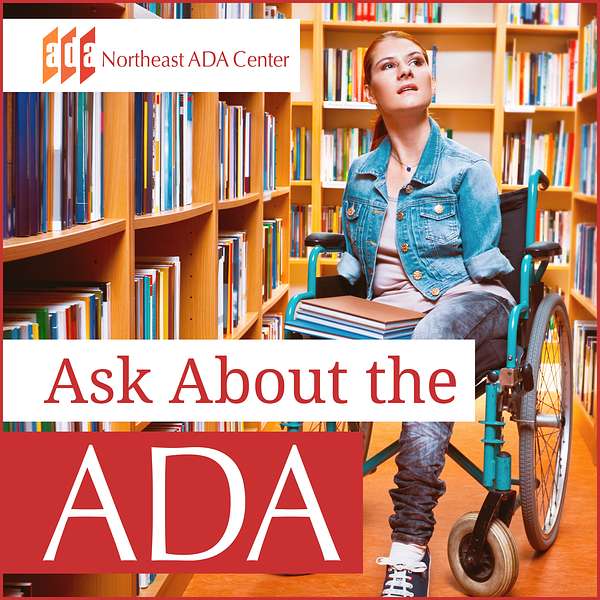
Ask About the ADA Podcast
Ask About the ADA Podcast
Ask About: Non-Essential Job Functions and Disclosing Disabilities
How should employees with multiple disabilities disclose to their employers— do you have to tell your employer about everything? Are employers required to make accommodations for non-essential job tasks? This edition of Ask About the ADA covers accommodations questions for when multiple disabilities are present and impact tasks on the job. For a transcript of today's episode, please visit the Ask About the ADA podcast feed on BuzzSprout.
NortheastADA.org
JOE ZESSKI: Hello. Welcome to Ask About the ADA, the podcast where we answer your questions about the Americans with Disabilities Act and how it impacts your everyday life in the community.
On this week's edition of Ask About the ADA we are going to explore questions around reasonable accommodations in the workplace.
This question comes from an individual. "If a person has multiple mental health conditions, what are the pros and cons of disclosing all or some of the existing disabilities?"
Well, to be honest, this question really can't be fully answered. It's something that would bear a much deeper conversation really tailored to the individual circumstances that the person is talking about. And even so, as we'll discuss in a moment, it truly is a personal decision, at its core.
First, let's focus on the basics. A reasonable accommodation is a request for change or adjustment in the workplace so that a person is able to do an essential job function.
If a person has a disability, but it doesn't impact their work, they are not required to request a reasonable accommodation, or in no way disclose that they have a disability. A person ultimately only has to disclose a disability when they are seeking an accommodation related to that disability, so that they can do some part or aspect of their job.
Otherwise, disclosing or not is purely personal, and, on that basis, you should look at different factors that are important to you as an individual, that you would weigh in every circumstance. It's a matter of assessing how comfortable one is with sharing their conditions. You should assess how it would be welcomed in the particular work environment, because every work environment is different and will receive and respect disability in a different way.
So it's a matter about understanding yourself and the environment that you're in, and what your needs are. It's a matter of balancing different conflicting needs and interests, and assessing how supportive the work environment will be.
But again, at the heart of it, the only time disclosure is necessary is when you, as an individual and an employee, are seeking a reasonable accommodation request. And your information that you share only needs to be limited to the relevant information in that situation.
So if you have multiple disabilities, but your accommodation request is only related to one of those, then the information that you share with your employer needs to only be related to that particular disability that's prompting you to request a reasonable accommodation. The other disabilities are purely up to your personal decision as to whether or not to disclose.
Let's now look at a second question related to reasonable accommodation.
Our second question comes from the other perspective, the point of view of the employer. Here it is. If a job task is not an essential job function, does an employer have to provide accommodation for that function?
Let's begin with the basics. An employee must be able to perform the essential job functions with or without a reasonable accommodation. So what is a reasonable accommodation? It's a change or adaptation to the work environment that allows an employee to be able to perform their job.
So what does this mean in terms of the non-essential functions? It means that, in this case, an employer could take a couple of different approaches.
First, they could choose to make an accommodation to allow the individual with a disability making the request to be able to do these non-essential functions, so that way they would provide a means for the employee to do these non-essential tasks.
Or, as an alternative to that, the employer could choose to eliminate or reassign that particular job duty. So again, this is up to the employer's decision how to approach the situation. The employer could redistribute the job function, as an alternative.
What the employer cannot do is choose not to accommodate the non-essential function, and then go on to penalize the employee with a disability because of their inability to do this non-essential task, or duty, or function.
So again, it's up to the employer what course they want to take. There are different options. However, what is at heart important is that the employer cannot penalize the individual for not being able to do this non-essential task. However, how the employer chooses to handle the situation is up to them.
We've explored different things about reasonable accommodation today here on the Ask about the ADA podcast. If you have questions about reasonable accommodations in the workplace, please feel free to reach out to us here at the Northeast ADA.
You can contact us at 1-800-949-4232. You can email us at northeastada@cornell.edu. And, of course, you can visit our website, www.northeastada.org, and you can find us on social media, as well.
As always, thanks to Grace Fairchild for producing and editing the podcast. Thanks as well to Peter Quinn of the Yang-Tan Institute's media team for additional editing, and thank you all for listening and being a part of our conversation.